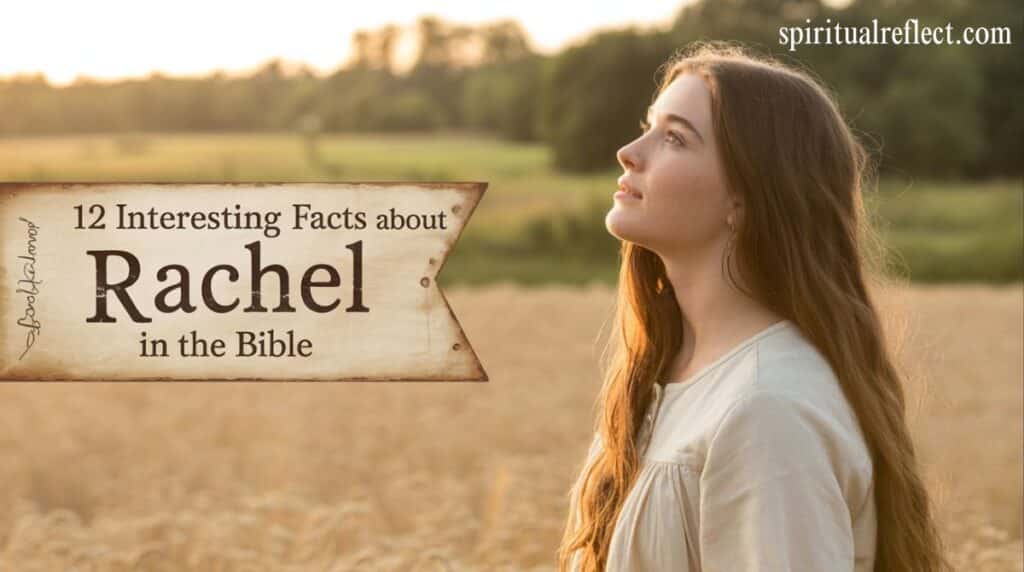12 Interesting Facts About Rachel in the Bible refers to the remarkable details surrounding the life of Rachel, one of the most beloved matriarchs in Scripture. Known as the younger daughter of Laban and the cherished wife of Jacob, Rachel’s story unfolds in the Book of Genesis, highlighting her beauty, struggles, and enduring influence. Each fact about her sheds light on ancient family dynamics, cultural customs, and the divine plan woven through her journey.
Few biblical figures capture the heart like Rachel. Her tale blends romance, sacrifice, rivalry, and sorrow in ways that still resonate today. From Jacob’s passionate devotion and fourteen years of labor to Rachel’s desperate prayers for children and her tragic death in childbirth, her life reads almost like a dramatic epic. These moments make Rachel not just a figure of history but a symbol of love, longing, and resilience.
Exploring 12 Interesting Facts About Rachel in the Bible offers more than historical knowledge. It uncovers spiritual lessons about patience, faith during hardship, and the lasting impact of legacy. Rachel’s story continues to inspire generations, reminding readers that even through human suffering and emotional struggle, God’s promises and divine timing remain faithful.
Rachel Was the Daughter of Laban and the Sister of Leah
Rachel was born into a complex family. She was the daughter of Laban, a wealthy but shrewd man from Haran, and the younger sister of Leah (Genesis 29:16). Leah is often described as “tender-eyed,” while Rachel was noted for her striking beauty and form.
This distinction set the stage for the rivalry that would later define much of their lives. While Leah became Jacob’s first wife through trickery, Rachel captured Jacob’s true love and devotion.
Key Fact: Rachel belonged to the patriarchal family of Abraham’s relatives in Mesopotamia, making her a part of the covenant line by marriage.
Rachel First Met Jacob at a Well
One of the most romantic moments in the Old Testament is the meeting of Rachel and Jacob at a well (Genesis 29:9–12). Jacob, fleeing from his brother Esau, stopped at Haran. There, he saw Rachel coming with her father’s sheep.
Jacob rolled the stone away from the well, watered her flock, and kissed her. Wells in Scripture often symbolize divine encounters—Hagar met God at a well, and so did Moses. In Rachel’s case, this meeting marked the beginning of one of the Bible’s most well-known love stories.
Why It Matters: The well meeting highlighted Jacob’s immediate devotion. From that day, he was determined to marry Rachel.
Jacob Loved Rachel and Worked Seven Years for Her
Few stories capture true love and sacrifice like this one. Jacob offered to work seven years for Laban in exchange for Rachel’s hand in marriage (Genesis 29:18).
The text beautifully says, “Jacob served seven years for Rachel, and they seemed unto him but a few days, for the love he had for her” (Genesis 29:20).
This wasn’t just an ancient transaction; it was an act of devotion. In an era where marriages were often arranged, Jacob’s willingness to labor so long revealed the depth of his affection.
Laban Deceived Jacob, Giving Him Leah Instead
After seven years, Jacob expected to marry Rachel. Instead, Laban tricked him by giving him Leah (Genesis 29:23–25). The cultural custom was that the older daughter had to marry first, but Laban’s deception was still considered unfair.
Jacob protested, but Laban made him agree to work another seven years if he wanted Rachel. Jacob accepted, which speaks volumes about his persistence and love.
Table: Jacob’s Marriage Arrangements
| Wife | How Marriage Happened | Children Connected |
|---|---|---|
| Leah | Laban’s deception | Reuben, Simeon, Levi, Judah, Issachar, Zebulun, Dinah |
| Rachel | Jacob’s true love worked for 14 years in total | Joseph, Benjamin |
| Bilhah | Rachel’s maidservant (surrogate) | Dan, Naphtali |
| Zilpah | Leah’s maidservant | Gad, Asher |
This complicated family dynamic sowed rivalry, jealousy, and strife for years.
Rachel Struggled with Infertility for Years

Rachel’s most painful struggle was her infertility. While Leah bore many children, Rachel remained childless (Genesis 30:1). In desperation, she cried to Jacob, “Give me children, or I die!”
In the patriarchal family structure, bearing children was a woman’s honor and security. Rachel’s inability to conceive led to envy and sorrow, creating intense rivalry with Leah.
Key Insight: Infertility was not only a physical struggle but also a spiritual and cultural burden. Many biblical women, including Sarah and Hannah, walked the same path of longing.
Rachel Offered Her Maidservant Bilhah as a Surrogate
In her desperation, Rachel gave her maidservant Bilhah to Jacob as a surrogate (Genesis 30:3). Through Bilhah, Rachel claimed two sons—Dan and Naphtali.
This act mirrored earlier cultural customs, where maidservants could serve as surrogate mothers. However, such arrangements often fueled family rivalry, as seen with Sarah, Abraham, and Hagar.
Rachel declared, “With great wrestlings have I wrestled with my sister, and I have prevailed” (Genesis 30:8). The language reveals her emotional struggle with envy and competition.
God Remembered Rachel and Opened Her Womb
After years of longing, the Bible says, “God remembered Rachel” (Genesis 30:22). She gave birth to Joseph, who would later save his family during the famine in Egypt (Genesis 30:24).
Years later, Rachel bore Benjamin, the youngest of Jacob’s twelve sons. Her children became central to the legacy of Israel.
- Joseph Rose to power in Egypt, second only to Pharaoh. His wisdom preserved Israel from famine.
- Benjamin: Ancestor of Israel’s first king, Saul, and later associated with the apostle Paul.
This moment shows the divine intervention of God’s timing, emphasizing that blessings often come after waiting.
Rachel Stole Her Father’s Household Gods
When Jacob fled Laban’s household, Rachel secretly stole her father’s household gods (teraphim) (Genesis 31:19). The reasons are debated:
- Inheritance rights: Ancient customs sometimes tied inheritance to possession of household idols.
- Superstition: She may have believed these idols held spiritual power.
- Family loyalty: Some argue she acted to prevent her father from using them for divination.
When Laban pursued Jacob, he accused him of theft. Jacob, unaware of Rachel’s actions, declared that whoever had them should not live—a chilling prophecy, given Rachel’s later death.
Rachel’s Death Came During Childbirth
Rachel’s life ended tragically. While traveling from Bethel to Ephrath, she went into hard labor with her second son (Genesis 35:16–19).
As she was dying, she named him Ben-Oni, meaning “son of my sorrow.” Jacob renamed him Benjamin, “son of my right hand,” symbolizing strength and favor.
Quote: “And it came to pass, as her soul was departing (for she died), that she called his name Ben-Oni” (Genesis 35:18).
Her death marked both deep sorrow and the continuation of God’s covenant promises through Benjamin.
Rachel Was Buried Near Bethlehem
Unlike the other patriarchs and matriarchs buried in the Cave of Machpelah, Rachel was buried alone near Bethlehem (Genesis 35:19–20).
Her tomb became a sacred site for centuries. Pilgrims, mourners, and exiles remembered her as the mother weeping for her children. To this day, Rachel’s Tomb near Bethlehem remains a place of prayer and mourning.
Rachel Is Remembered in Prophecy

Rachel’s grief echoed into prophetic writings. Jeremiah 31:15 describes her weeping for her children, representing the mourning of Israel’s exiled group.
Later, the New Testament applied this prophecy to the tragedy of Herod’s massacre of Bethlehem’s infants (Matthew 2:18). Rachel’s tears became a symbol of maternal grief across generations.
This prophetic remembrance shows how her story carried symbolic weight far beyond her own life.
Rachel’s Legacy Endures Through Her Sons
Rachel’s influence endures not through her short life but through her sons:
- Joseph: His leadership in Egypt saved the Israelites during the famine. His story filled the final chapters of Genesis.
- Benjamin: His descendants included key figures like King Saul and the Apostle Paul.
Together, Rachel’s children carried forward her legacy of resilience, faith, and suffering turned to purpose.
Table: Rachel’s Legacy in Israel
| Son | Role in Israel’s History |
|---|---|
| Joseph | Preserved Israel in famine; group of Ephraim and Manasseh descended from him |
| Benjamin | Preserved Israel in famine; a group of Ephraim and Manasseh descended from him |
Her story is not simply one of sorrow and loss. It is also about hope, redemption, and the fulfillment of God’s promises.
Lessons from Rachel’s Life
Rachel’s life offers profound lessons for today:
- True love requires sacrifice: Jacob’s devotion reminds us of the value of patience.
- Envy destroys peace: Rachel’s rivalry with Leah shows how jealousy corrodes relationships.
- Faith during hardship matters: God remembered Rachel, teaching us to trust in His timing.
- Suffering can still yield legacy: Though Rachel died young, her children shaped Israel’s future.
Her story is a reminder that life’s struggles don’t erase divine purpose.
Conclusion
The study of 12 Interesting Facts About Rachel in the Bible shows her as more than just Jacob’s beloved wife. She was a woman of beauty, love, and deep struggles. Her story is marked by devotion, rivalry, sorrow, and faith. Even in her pain, Rachel became a vital part of God’s plan through her sons, Joseph and Benjamin. Her life reflects both human weakness and divine purpose.
By exploring 12 Interesting Facts About Rachel in the Bible, we see lessons of patience, hope, and trust in God’s timing. Rachel’s tears remind us of human suffering, but her legacy points to redemption and lasting impact. Her journey speaks to anyone who has faced waiting, longing, or loss. Rachel’s story still matters today, offering encouragement that even through sorrow, God’s promises remain true and unshaken.
FAQs
Q1. Who was Rachel in the Bible?
Rachel was the younger daughter of Laban, the beloved wife of Jacob, and the mother of Joseph and Benjamin (Genesis 29–35).
Q2. Why is Rachel important in the Bible?
Rachel is remembered as one of the matriarchs of Israel, and her sons Joseph and Benjamin played major roles in Israel’s history.
Q3. Where is Rachel buried?
Rachel was buried near Bethlehem, and her tomb remains a significant site of prayer and remembrance today (Genesis 35:19).
Q4. Did Rachel really steal her father’s household gods?
Yes, Genesis 31:19 records that Rachel secretly took her father Laban’s idols, though her motives are debated.
Q5. How did Rachel die in the Bible?
Rachel died giving birth to her second son, Benjamin, on the way to Bethlehem (Genesis 35:16–18).

Rana Ahmad is the creator of Spiritual Reflect, where she shares insights on personal growth, mindfulness, and meaningful living to inspire a more intentional life.







